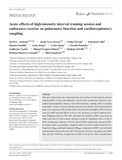Mostrar el registro sencillo del ítem
Acute effects of high-intensity interval training session and endurance exercise on pulmonary function and cardiorespiratory coupling
| dc.creator | Andrade, David C. | es_ES |
| dc.creator | Arce Álvarez, Alexis | es_ES |
| dc.creator | Parada, Felipe | es_ES |
| dc.creator | Vásquez Muñoz, Manuel | es_ES |
| dc.creator | Izquierdo Redín, Mikel | es_ES |
| dc.date.accessioned | 2021-02-02T09:41:09Z | |
| dc.date.available | 2021-02-02T09:41:09Z | |
| dc.date.issued | 2020 | |
| dc.identifier.issn | 2051-817X (Electronic) | |
| dc.identifier.uri | https://hdl.handle.net/2454/39127 | |
| dc.description.abstract | The aim of this study was to determine the acute effects of high-intensity interval training (HIIT) exercise and endurance exercise (EE) on pulmonary function, sympathetic/parasympathetic balance, and cardiorespiratory coupling (CRC) in healthy participants. Using a crossover repeated-measurements design, four females and four males were exposed to EE (20 min at 80% maximal heart rate [HR]), HIIT (1 min of exercise at 90% maximal HR per 1 min of rest, 10 times), or control condition (resting). Pulmonary function, HR, CRC, and heart rate variability (HRV) were assessed before and after the interventions. Results revealed no significant effects of EE or HIIT on pulmonary function. The EE, but not HIIT, significantly increased CRC. In contrast, HRV was markedly changed by HIIT, not by EE. Indeed, both the low-frequency (LFHRV) and high-frequency (HFHRV) components of HRV were increased and decreased, respectively, after HIIT. The increase in LFHRV was greater after HIIT than after EE. Therefore, a single bout of HIIT or EE has no effects on pulmonary function. Moreover, CRC and cardiac autonomic regulation are targeted differently by the two exercise modalities. | en |
| dc.description.sponsorship | This work was supported by Vicerrectoría de Investigación from Universidad Mayor (PEP I-2019050). Del Rio R., is supported by Fondecyt grant 1180172 and the Basal Center of Excellence in Aging and Regeneration (AFB 170005) and the special grant 'Lithium in Health and Disease' from the Sociedad Química y Minera de Chile (SQM). | en |
| dc.format.extent | 14 p. | |
| dc.format.mimetype | application/pdf | en |
| dc.language.iso | eng | en |
| dc.publisher | Wiley | en |
| dc.publisher | American Physiological Society | en |
| dc.publisher | The Physiological Society | en |
| dc.relation.ispartof | Physiological Reports, 2020, 8 (15):e14455 | en |
| dc.rights | © 2020 The Authors. This is an open access article under the terms of the Creative Commons Attribution License, which permits use, distribution and reproduction in any medium, provided the original work is properly cited. | en |
| dc.rights.uri | http://creativecommons.org/licenses/by/4.0/ | |
| dc.subject | Autonomic control | en |
| dc.subject | Cardiorespiratory coupling | en |
| dc.subject | Endurance exercise | en |
| dc.subject | Exercise training | en |
| dc.subject | High- intensity interval training | en |
| dc.title | Acute effects of high-intensity interval training session and endurance exercise on pulmonary function and cardiorespiratory coupling | en |
| dc.type | info:eu-repo/semantics/article | en |
| dc.type | Artículo / Artikulua | es |
| dc.contributor.department | Ciencias de la Salud | es_ES |
| dc.contributor.department | Osasun Zientziak | eu |
| dc.rights.accessRights | info:eu-repo/semantics/openAccess | en |
| dc.rights.accessRights | Acceso abierto / Sarbide irekia | es |
| dc.identifier.doi | 10.14814/phy2.14455 | |
| dc.relation.publisherversion | https://doi.org/10.14814/phy2.14455 | |
| dc.type.version | info:eu-repo/semantics/publishedVersion | en |
| dc.type.version | Versión publicada / Argitaratu den bertsioa | es |



